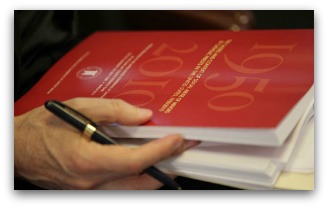Eureka Street
June 15, 2011
http://www.eurekastreet.com.au/article.aspx?aeid=26813
 |
One of the intriguing qualities of Pope Benedict XVI is his intellectual style.
He consistently uses large theoretical constructs, such as secularism, to reflect on the condition both of Western societies and of the Church. He also regularly attributes the dysfunctional aspects of both Church and society to the embrace of false theory. He has regularly attributed sexual abuse by Catholic clergy to bad moral theory.
The strength of this way of viewing the world is that it simplifies complex realities and provides a focus for reflection and conversation with those of a different view. Particularly during his visit to England earlier this year the Pope Benedict has stirred helpful conversation about the place of religion in society. His intellectual style engaged his listeners and offered a different perspective even if it did not persuade them.
The breadth and abstraction of this intellectual style also allow space for confident leadership. If you believe you can identify the causes of weakness in society and the Church, you may also be able to exercise control over them. If the root of corruption lies in false theory, you can work to convert people to true theory. In a church you may also be able to proscribe bad theory, to prescribe true theory, and so to eradicate corruption.
The strengths of this intellectual style are also its potential weaknesses. When you think in large theoretical terms it is easy to miss the subtle relationships that are crucially important. It is also very easy to miss the ways in which your own perspective may be part of the problem, not simply an authoritative guide to its solution. If your diagnosis is inaccurate your remedy will be at best unavailing, and at worst counterproductive.
i
When Pope Benedict blames bad moral theory for sexual abuse by the clergy, he may offer an example of the weaknesses of this intellectual style. His judgment is firmly held: he has made it in at least three places. In itself his argument is not without plausibility.
Proportionalism, the moral theory that he has in mind, is complex. It could be misunderstood as propounding a moral relativism, within which we could not speak of actions as in themselves right or wrong without referring to our intentions, our circumstances or to the perceived consequences. Someone who held that point of view might then be able to argue that in his circumstances paedophilia would be morally acceptable.
The Pope could also argue that, although different moral theories may have little currency among Catholics generally, they are significant because they influence the moral thinking of future priests. And moral thinking does influence action. Finally, the theory he criticises enjoyed some currency among Catholic moral theorists in the 1970s, the time when clerical abuse began to rise sharply.
The John Jay report (pictured) argues against the influence of this theory, at least in the US. It suggests that most offenders received a traditional moral theology that emphasised the good and evil of actions independent of circumstances or intention. The offending clergy, too, recognised the sinfulness of their actions and put weight on their confessing them and being forgiven by God. Their spirituality was focused on the individual's relationship to God.
The roots of abuse then lay in the way in which Catholic life and clerical life were construed before Vatican II, not in moral theories that arose after it.
These conclusions invite reflection that might lead to an explanatory theory. But any satisfactory theory will be unlikely to be simple or to be cast in terms of large intellectual movements.
It will need to reflect on the relationships between interlocking aspects of Catholic life in different periods and cultures. It might ask how power, sexuality, celibacy, clerical status, sin, confession and God were interrelated in the mid 20th century, and what changes in relationship took place from the 1960s and subsequently.
Such reflection will inevitably turn to the ways in which the interweaving of these elements has shaped Catholic thinking about God and the church. Moral theories will be part of the weave of this tapestry, but to focus on them alone entails missing much that is salient.
These kinds of question are susceptible to a patient and intuitive teasing out of thought, of story, of experience and of imagery. They involve a good deal of self-reflection and a readiness to change. They are less susceptible to theoretical analysis in preconceived terms.
This is not to discount the Pope's intellectual style and his insistence on objective moral standards. In an Australian environment where many Christians are among those who see no moral problem in trafficking people to Malaysia to achieve political ends, I find the Pope's insistence on absolute moral values very welcome.
But in the case of clerical sexual abuse, his analysis is not pertinent. It is important for the Church that he leads and for the victims of abuse that it be pursued deeper.
Any original material on these pages is copyright © BishopAccountability.org 2004. Reproduce freely with attribution.